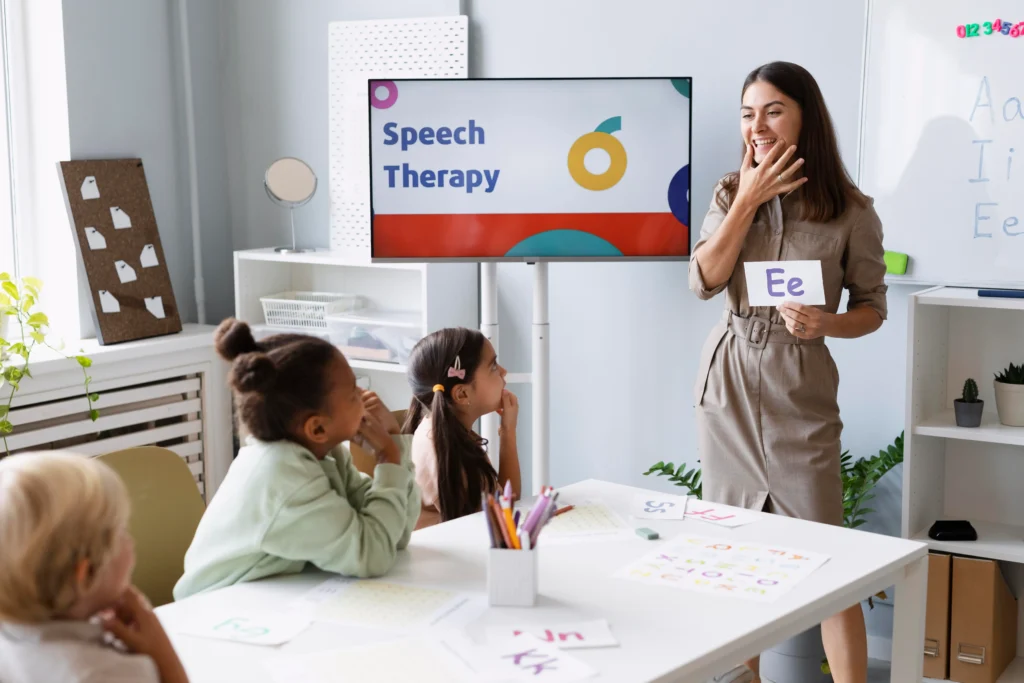Ever noticed that your toddler suddenly begins pointing to things or attempting to say one-syllable words like “mama” or “ball”? That’s a peek at their speech and language development. These early words are important stepping stones in your child’s communication process.
Early communication skills enable children to communicate their needs, form relationships, and make sense of the world. When there is a delay, it’s not merely about speaking – it can have an impact on social interaction, emotional expression, and even learning. That’s when early intervention comes into play.
What is Speech Therapy for Toddlers?
Speech therapy is an expert support service to assist children with communication challenges. It’s about getting things (receptive language), saying what’s on your mind (expressive language), and communicating socially.
A Speech-Language Pathologist (SLP) is the professional who facilitates this therapy. They assess your child’s milestones of development and develop personalized plans to attack areas such as pronunciation, vocabulary, following directions, or late speech. And yes, verbal skills and verbal communication is very important.
Typical problems in toddlers are:
- Late talking (failure to talk when spoken to)
- Trouble forming words or sentences
- Language understanding issues
- Decreased interest in social interactions

When Should You Start Speech Therapy?
Children grow at their own pace – but there are standard communication milestones that help guide expectations:
| Age | Communication Milestones |
| 12 months | Babbling, responding to name, using simple gestures |
| 18 months | Saying 10 – 20 words, understanding simple commands |
| 25 months | Combining 2 – 3 word phrases, vocabulary of 50+ words |
| 36 months | Using short sentences, answering simple questions |
If your toddler is a delayed talker, these are the signs your toddler may benefit from therapy:
- Not babbling by 12 months
- Limited vocabulary at 18 – 24 months
- Difficulty understanding or following simple directions
- Lack of social interest (e.g., eye contact, sharing)
Waiting it out may seem tempting, but research shows that early speech intervention leads to better long-term outcomes than a “wait and see” approach.
Why Early Intervention Is Important?
The early years, especially from birth to 5 years of age are crucial because of brain plasticity, or the brain’s ability to shape and change quickly. If the disorder is treated in these early years, complications in adulthood can be avoided.
Principal benefits of early intervention services:
- Improves verbal communication and comprehension
- Builds confidence
- Increases academic and social readiness
- Assists in identifying and supporting existing conditions such as Autism Spectrum Disorder (ASD)
There is evidence that speech development is minimized by early intervention for persistent language delay, especially if it is initiated through a formal Early Intervention Program.

How to Get Started?
If you’re concerned, don’t delay – start with a conversation:
- Talk to your pediatrician about your child’s communication.
- Use developmental screening tools like ASQ or M-CHAT.
- Get an evaluation by a licensed Speech-Language Pathologist (SLP).
- Choose the right therapy format:
- In-clinic (traditional setup)
- In-home (great for familiar environments)
- Online (convenient and flexible)
What to Expect in Speech Therapy
Every child’s plan is personalized, but here’s what’s commonly involved in child development:
- Goal Setting: Based on your child’s needs and age level
- Play-Based Activities: Learning from songs, toys, and routines
- Parental Involvement: You’ll find out how to make progress at home
- Progress Monitoring: Continuous monitoring to make changes to therapy and identify achievements.
Tips for Parents
You play a vital role in your child’s speech development. Here’s how to help:
- Talk often: Tell what you are doing, seeing, and feeling
- Read each day together, whether only photographs.
- Point to things and actions: “This is a spoon,” “You’re jumping!”
- Encourage turn-taking in conversation
- Restrict the use of screens and emphasize face-to-face communication
FAQs
Can my toddler catch up without therapy?
If your child consistently lags behind several communication milestones, like not babbling at 12 months or having very few words at 18 – 24 months. Waiting only for a “wait and see” solution can result in lost ground in early brain development, in which case intervention will be most beneficial. Your child must be evaluated by a trained speech-language pathologist (SLP). Early intervention, even for a short while, can make an enormous difference in your child’s confidence and communication ability.
Is speech delay the same as language delay?
No, they are not the same, though they tend to occur together. A speech delay is technically a term used to describe trouble with the sound of a child, syllables, or words. This includes trouble with articulation, fluency (such as stuttering), or voice quality. A language delay is trouble with talking and listening to language, this includes receptive language (understanding what’s said to them) and expressive language (putting thoughts into words).
A child may be able to say words quite well but may not be applying them to a proper context, which would show a language delay. Determination of whether a child has a speech disorder, a language disorder, or both is key to the identification of the right early intervention program.
How long does speech therapy last?
Speech therapy length varies with the etiology and severity of the delay, the child’s age, and the sooner the intervention. Some late talkers or children with mild delays may make a remarkable amount of progress within 3 to 6 months of consistent therapy. Others, particularly those with more complex diagnoses such as Autism Spectrum Disorder, developmental delay, or underlying sensory issues, may need to receive therapy for a year or more.
Is it too soon or too late to start?
It is never too soon to start speech therapy if a delay in language or speech difficulty is noticed. The earlier the treatment is administered, the better because the initial three years of life are when the brain is most plastic and responsive to learning new habits of communication. This neuroplasticity stage grants toddlers a window of opportunity to access methods of catching up sooner if supplemented by speech therapy.
Conclusion
Should your child not be on track with communication milestones, don’t worry, but don’t wait. Early intervention by a trained developmental therapist or speech-language therapist may be a lifesaver.
Speech therapy is not simply talking – it’s about connecting, understanding, and succeeding. And so if you are worried, get in contact. Your child’s voice does matter, and the right help can help them find it.

